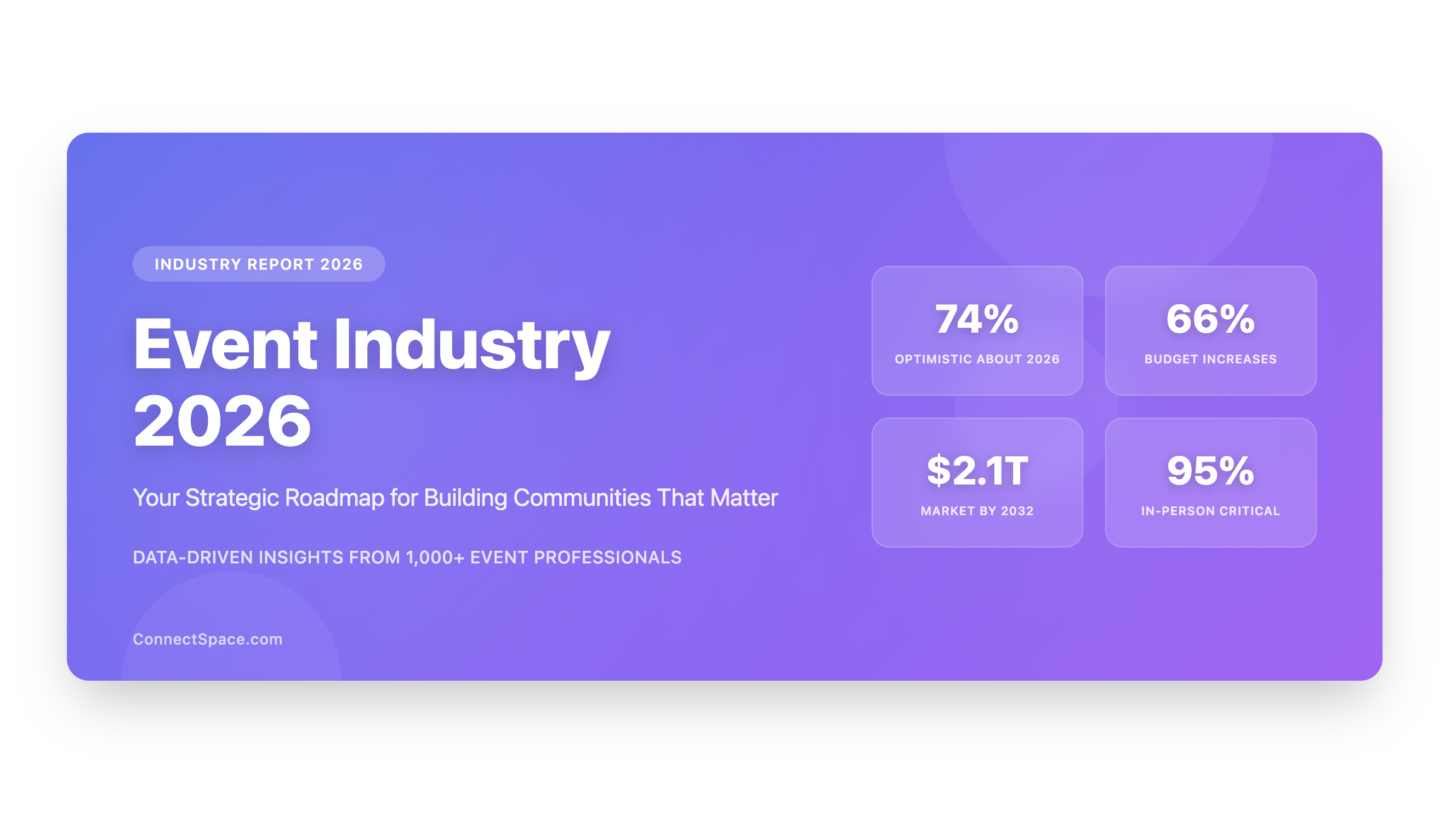Download Our Free Guide
Fill out the form to receive instant access

Despite years of digital transformation, 95.4% of event professionals still rate in-person events as "very important" or "moderately important," according to EventsAir's industry report². Yet the definition of what constitutes an "event" has fundamentally shifted. Today's most successful organizations are thinking beyond the traditional conference model, embracing a portfolio approach that includes:
This evolution requires technology that can adapt to your changing needs—not force you into a one-size-fits-all box. That's where platforms like Connect Space are leading the charge, offering cloud-based flexibility that scales from intimate executive roundtables to massive industry conventions.
The days of planning events based on gut feelings are over. As Eventify's 2025 trend analysis notes, data-driven decision-making is revolutionizing the event industry⁵. In 2026, successful event professionals will leverage data at every stage of the event lifecycle:
Organizations using modern event management systems report 22% higher satisfaction rates compared to those relying on traditional methods, according to SpotMe's research⁶. The message is clear: data isn't just nice to have—it's essential for survival.
As noted in Cvent's 2025 trend analysis, personalization is everywhere—from Netflix recommendations to Spotify Wrapped playlists⁴. Attendees expect events to anticipate their needs. In 2026, personalization goes beyond name badges:
This level of personalization requires sophisticated technology working behind the scenes. The release of Connect Space's new version addresses this need directly, with enhanced features designed to help associations and economic development organizations deliver the personalized experiences their members demand.
The most significant shift for 2026? Events are no longer isolated experiences but touchpoints in an ongoing community journey. 80% of organizers believe it's crucial to grow communities around their events, according to Eventbrite's research³, recognizing that community investment drives:
Smart organizations are embracing the psychological principle of the IKEA effect—where individuals feel deeper connection to things they help create, as highlighted by SpotMe⁶. By involving members in event planning, content creation, and community building, you transform passive attendees into active stakeholders.
Consider implementing:
With 79.3% of event professionals using event management software (EventsAir)² and annual tech investments typically ranging from $10K-$30K², the industry has clearly embraced digital transformation. However, disconnected systems create inefficiencies that drain resources and frustrate teams. In 2026, the winners will be organizations that consolidate their tech stack into integrated platforms that:
This is precisely why Connect Space has focused on creating a comprehensive, cloud-based platform that brings together community management and event execution in one unified system.
With 54% of meeting professionals rating sustainability as extremely or very important (American Express Global Business Travel)¹, environmental and social responsibility have become non-negotiable. For associations and economic development organizations, this means:
With 24.1% of event professionals identifying sponsorship acquisition as a significant challenge (EventsAir)², 2026 demands a new approach. According to Bizzabo's research, while organizations spend more on sponsoring events (53%) than hosting them (47%)⁷, sponsors expect more than logo placement—they want measurable engagement and clear ROI.
Successful sponsorship strategies will include:
Gen Z has officially overtaken Baby Boomers in the workforce, according to Freeman's trends report⁸. This demographic shift brings new expectations:
Organizations must adapt their event strategies to attract and retain this emerging professional demographic while continuing to serve their existing member base.
The rise of smaller, regional events reflects a fundamental truth: not everyone can travel to your annual conference. According to a Forrester study commissioned by Cvent, 75% of small in-person events are primarily executed in the field⁴. By bringing experiences directly to your community through:
You demonstrate commitment to serving all members, not just those with travel budgets.
Consolidate your event tech stack into a unified platform that can handle everything from registration to year-round community engagement. The new version of Connect Space, designed specifically for associations and economic development organizations, offers exactly this type of comprehensive solution.
Start collecting and analyzing data now to inform 2026 planning. Focus on metrics that matter: engagement depth, community growth, and sponsor value delivery.
Build events that can pivot between in-person, virtual, and hybrid formats without losing their essence (currently 60% in-person, 35% virtual, 5% hybrid⁷). Your technology platform should support this flexibility seamlessly.
Shift from event-centric to community-centric thinking. Use events as catalysts for ongoing engagement rather than standalone experiences.
Whether to boards, sponsors, or members, be prepared to show tangible value through sophisticated analytics and compelling success stories. Research shows 78% of organizers identify in-person events as their most impactful marketing channel⁷.
As the event industry evolves, so does Connect Space. The release of the new version of our software builds on years of serving associations, economic development organizations, and B2B enterprises with enhanced features designed specifically for the challenges of 2026:
The future belongs to organizations that view events not as isolated occurrences but as strategic touchpoints in building thriving, engaged communities. Connect Space provides the technology foundation to make this vision reality.
The convergence of increased budgets, evolving attendee expectations, and technological advancement creates unprecedented opportunity for forward-thinking organizations. With 53.9% of attendees planning to attend more in-person events in 2025 compared to 2024⁷, and the global events industry expected to grow from $1.1 trillion to $2.1 trillion by 2032⁷, those who act decisively to modernize their approach will find themselves leading thriving communities that deliver measurable value to all stakeholders.
The question for your organization isn't whether to evolve—it's whether you'll lead the change or follow others who do. With the right strategy, technology, and commitment to community, 2026 can be your most successful year yet.
Ready to explore how Connect Space can power your organization's growth? Visit www.connectspace.com to learn more about our comprehensive platform and upcoming feature releases designed specifically for professional event planners, associations, and economic development organizations.
Connect Space is a cloud-based community and event management tool that enables organizations to bring people together to learn, explore, and grow. Trusted by associations, economic development organizations, and corporate enterprises, we're committed to helping you create events and communities that matter.
